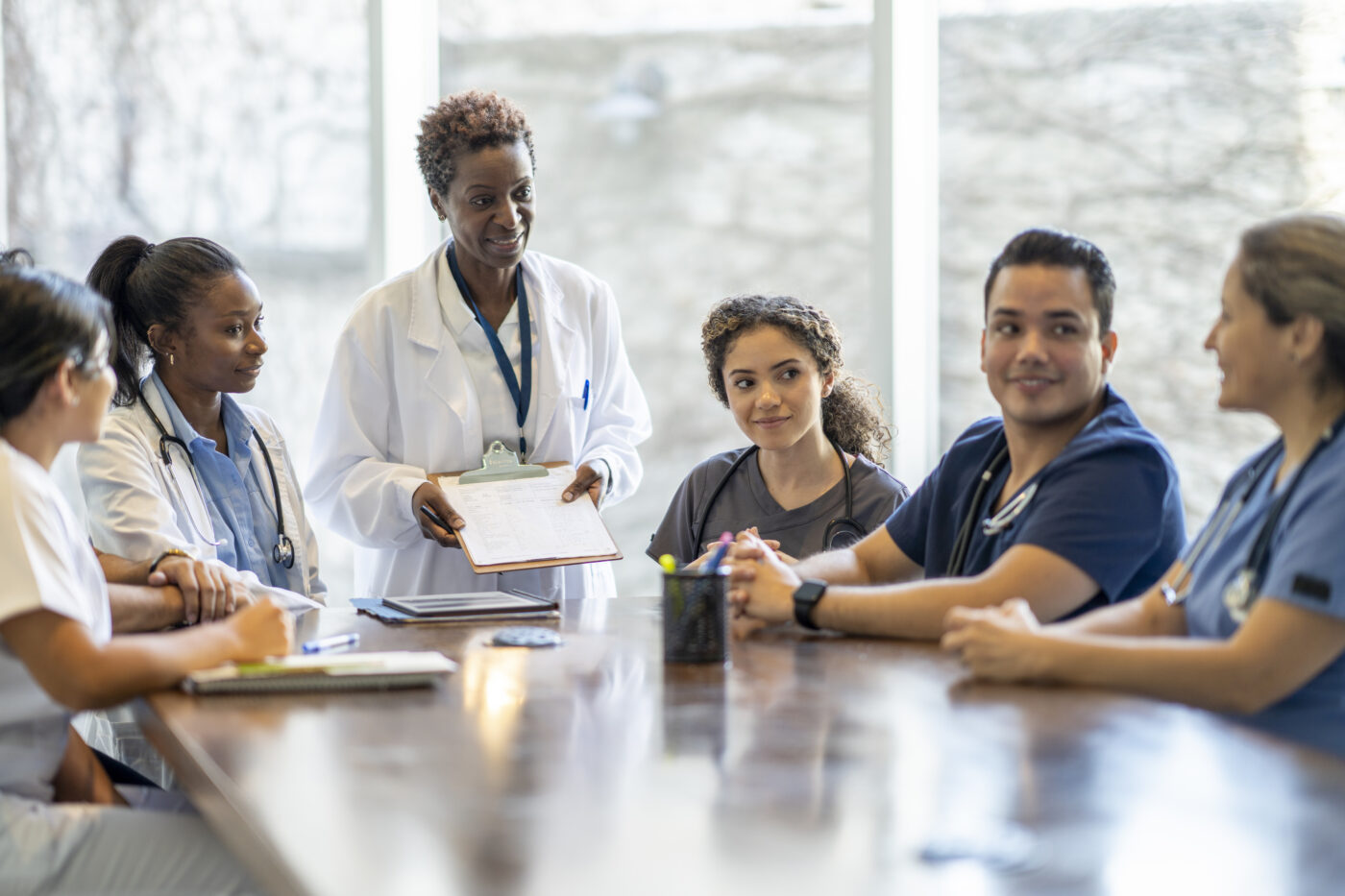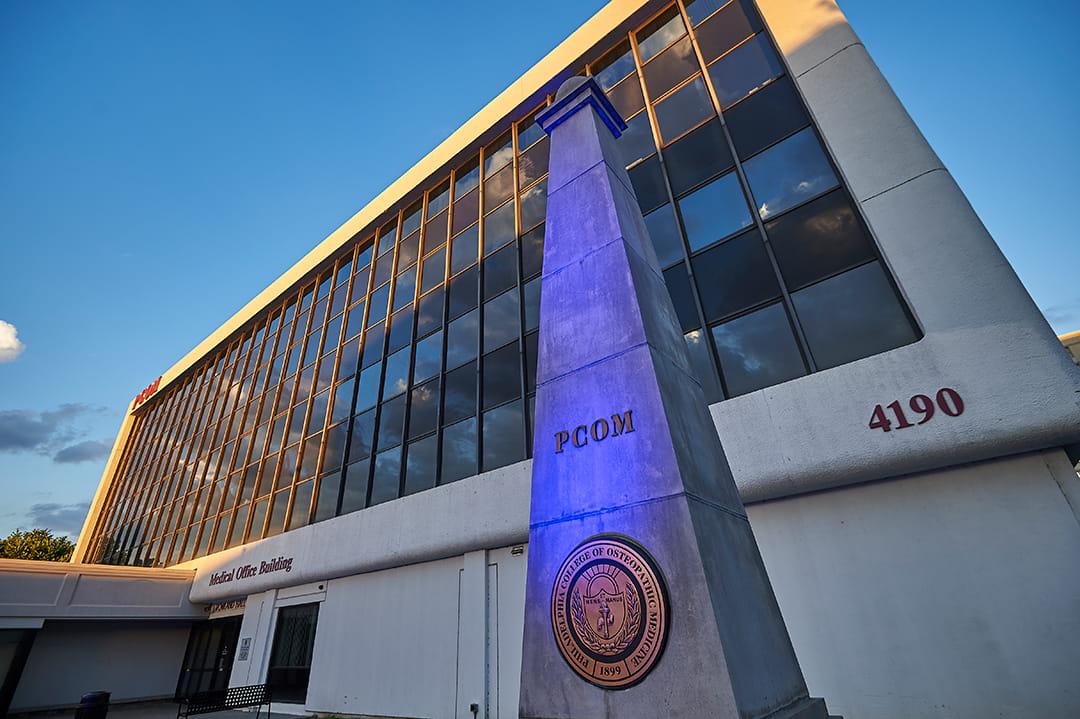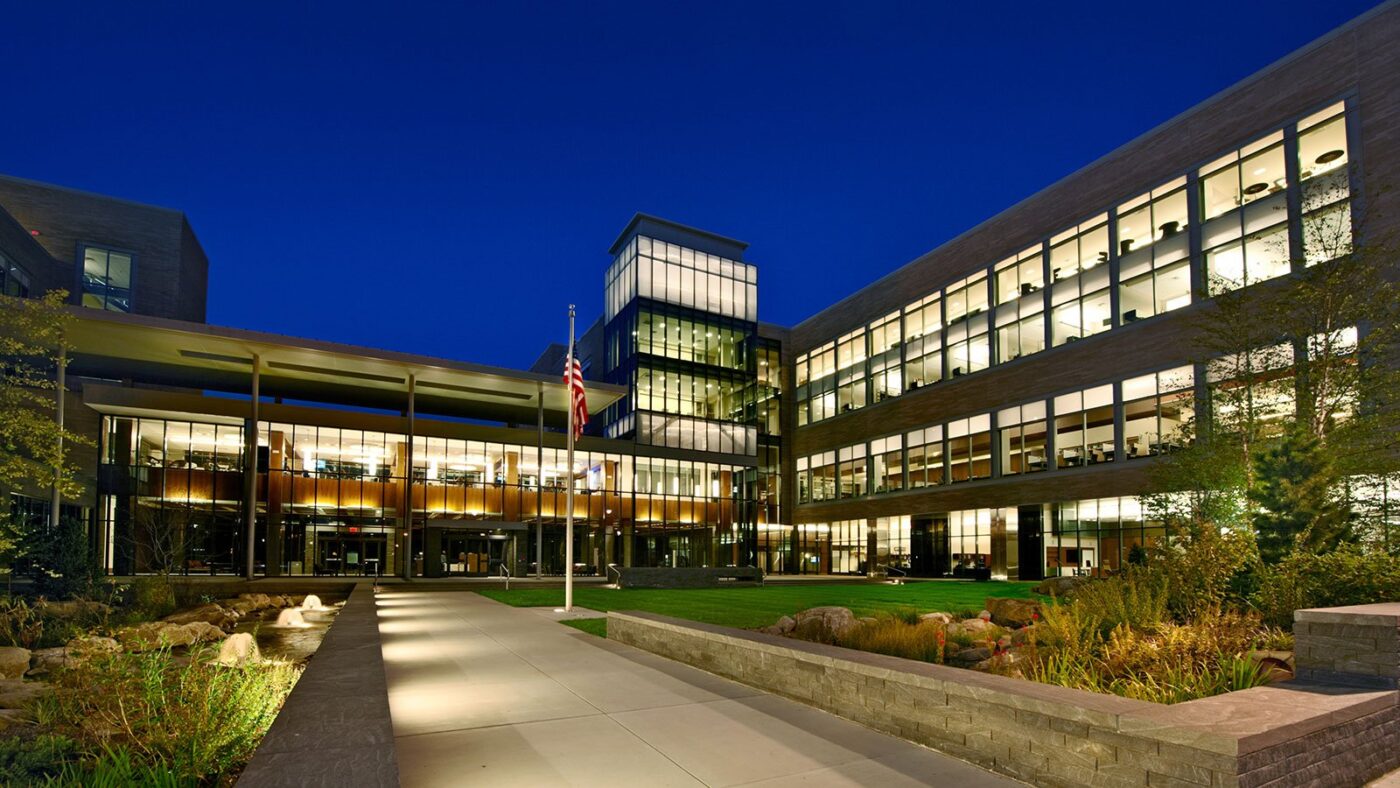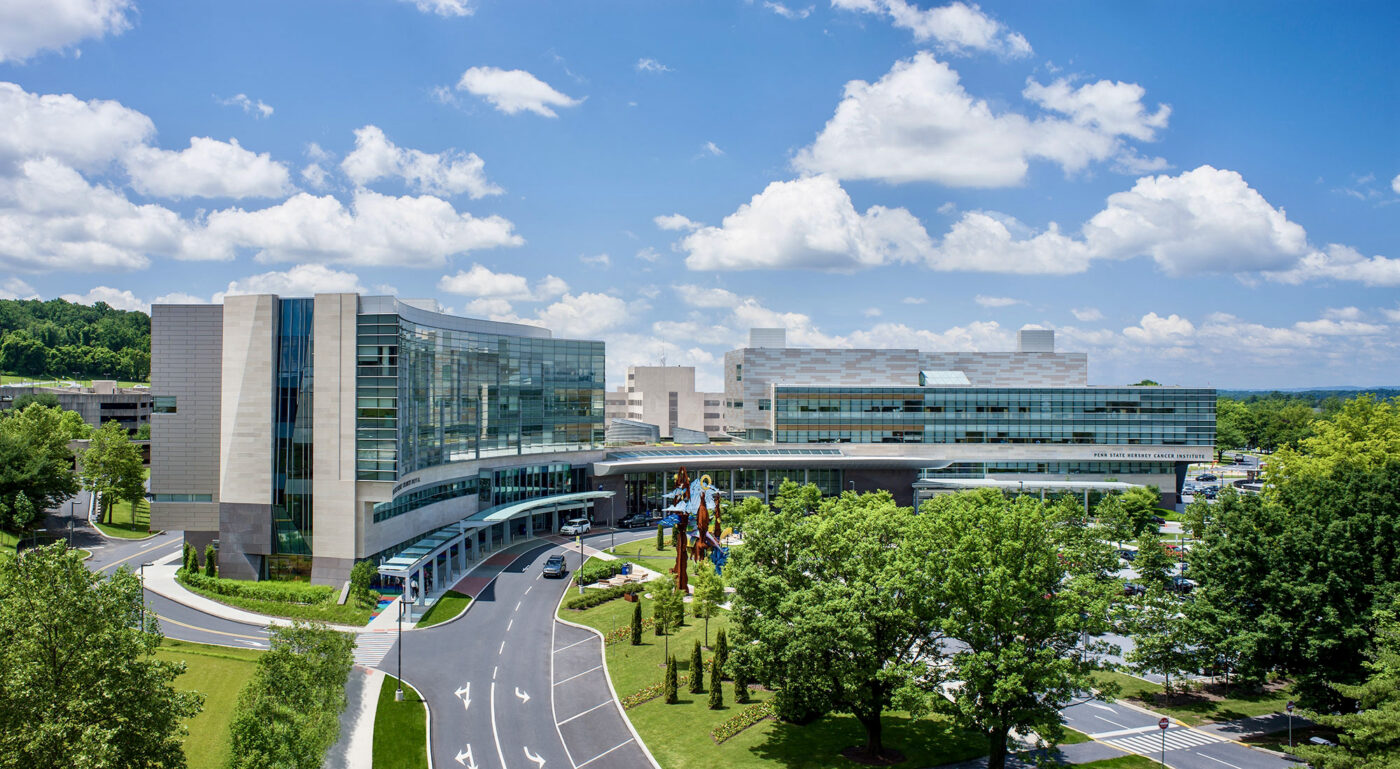Located in the high-paced city of Philadelphia, many believe that the Lewis Katz School of Medicine at Temple University (LKSOM) stands out as one that has sent out skilled, patient-centered medical professionals since 1901. Being the first of the co-educational medical schools in Pennsylvania brought the school national fame and opened the door for Temple Medical School to focus on inclusion, diversity, and social justice.
The Lewis Katz School of Medicine at Temple University is part of a huge health system that includes Temple University Hospital (TUH), clinical training sites, and specialty centers. Students are able to learn from a large, diverse population of patients, including some of the brightest medical professors and physicians in the country. Students who apply are seeking to learn a way of doing medicine that stresses individualized patient care, education, treating underserved groups, and high-level research.
Temple Medical School has several top-notch programs, including the Temple University BS/MD programs, the Temple PA program, and programs for Biomedical Sciences, urban Bioethics, Graduate Medical Education, Narrative Medicine, Continuing Medicine, and the Postbac Program.
Applying to a school like the Lewis Katz School of Medicine at Temple University is no easy task, and competition to matriculate is fierce. Preparation is key, and having the help of professionals is highly advisable.
This guide is designed to help you navigate your way through the entire process of meeting admissions requirements, submitting primary and secondary applications, and reviewing school statistics. This gives you the best possible chance to matriculate to the school of your choice. If you have any questions as you read through the guide, feel free to reach out to us for assistance.
Be an Informed Applicant
Earning an MD is a challenging feat, and only the most dedicated aspiring physicians stay the course to the end. If you are one of those dedicated individuals, you’ll have spent plenty of time researching the various medical schools in Pennsylvania, and possibly in other states to determine which school is the best fit for you.
The Lewis Katz School of Medicine at Temple University is a particularly competitive school to gain acceptance to, and those students who follow the instructions carefully and prepare as much as possible are the ones who will have the greatest chance of being invited to an interview and receiving an acceptance letter. If you really want to be among the candidates to attend Temple Medical School, follow this guide and get as much help as you can. Our medical school guides will be an incredible asset to you during this process.
By the way, we offer these medical school guides for many medical school programs. If you are looking for a medical school close to home, you can try searching “medical schools near me,” and then check to see if we have a guide available for that school.
This guide was built specifically for the Lewis Katz School of Medicine at Temple University and should not be considered a guide for any other medical school.
Topics covered in this guide include:
- Why Lewis Katz School of Medicine at Temple University?
- Medical Programs at Temple Medical School
- Facilities, Student Organizations, and More
- Selection Factors: What Temple Medical School Looks for in an Applicant
- Admissions Requirements for the Lewis Katz School of Medicine at Temple University
- Temple Medical School Acceptance Rate & Admissions Statistics
- Temple Medical School Tuition & Cost of Attendance
- AMCAS Primary Application & Temple Medical School Secondary Application
- Temple Medical School Secondary Application: Essay Prompts, Sample Answers, and Advice
- Temple Medical School Interview Process
- Medical School Admissions Consulting
- Voluntary Healthcare Internships Abroad
Personalized Help
One-to-one, personalized assistance through the medical school application program is hands-down the best way to prepare for applying to Lewis Katz School of Medicine at Temple University, or any school for that matter. Our medical school admissions consulting program is designed to make this process as easy as possible for you and your family. Our experts will help you with your applications, provide advice about your essay responses, and prepare you for your interview, including running you through mock interviews. Contact us here if you have any questions.
Why Lewis Katz School of Medicine at Temple University
Those who apply for the Lewis Katz School of Medicine at Temple University should know a little about the school’s namesake, for that will give them an insight into the mission and vision of the program. Lewis Katz earned his BS in Biology from Temple University in 1963. He led his peers at the Dickinson School of Law and succeeded in everything he dipped his hands into, including law, sports, finance, business, philanthropy, and publishing.
Lewis Katz started a foundation that focused on medical research, and he built a variety of schools and centers for children throughout New Jersey. He spent his lifetime helping people who needed it the most. He served as a trustee at Temple University and worked on many boards related to the Temple University Health System and Fox Chase Cancer Center. In 2014, Temple University granted him an honorary degree.
Katz went all in to support the medical school he loved. He gave the largest donation in the history of Temple University, an incredible $25 million. The school was named after him in October 2015, and they adopted his values of determination, making a difference, and paying it forward.
The Lewis Katz School of Medicine at Temple University has developed a program that teaches students to one day be physicians who are patient-centered, lifelong learners, and compassionate practitioners with the most updated and modern education in medical knowledge and technique. They aplso focus on advanced research.
If you feel drawn to a humanistic approach to medical education and training, Temple Medical School may be the right choice for you. Being patient-focused, community-aware, and compassionate towards all patients are key themes in the educational focus. Combine the newest, most state-of-the-art technology with skilled clinical training for a well-rounded medical education that has earned Temple Medical School worldwide recognition.
LKSOM has several early assurance medical programs available to permit potential candidates to be considered for acceptance before their senior year of college. Early assurance programs at the St. Luke’s Regional Campus include students from DeSales University, Lehigh University, Moravian College, and Muhlenberg College. Early assurance medical programs at Temple University or Washington & Jefferson Colleges are also an option during a student’s junior year of undergraduate studies. Candidates for early assurance must maintain a 3.6 GPA or higher.
Students at Temple Medical School get to learn from some of the most brilliant physicians and professors in the country, including:
- Rob McNamara, MD, FAAEM – Chief Medical Officer, Temple University Physicians
- David Fish, MD – Director of Critical Care Anesthesiology
- Megan Healy, MD – Assistant Program Director, Emergency Medicine Residency
- Scott Shore, MD – Associate Dean, Graduate and Post Baccalaureate Programs
Lewis Katz School of Medicine at Temple University Ranking
US News and World Report states that the Lewis Katz School of Medicine at Temple University ranked:
- #6 in Most Diverse Medical Schools (tied)
- #68 in Best Medical Schools: Research (tied)
- #88 in Best Medical Schools: Primary Care (tied)
- #110 in Most Graduates Practicing in Primary Care Fields
Medical Programs at Temple Medical School
The Lewis Katz School of Medicine at Temple University is well-known for its popular 4-year Medical Doctor (MD) program and the Physician Assistant (PA) program, as well as other educational offerings. The courses are built to be challenging and engaging, with a focus on creating well-rounded physicians and scientists.
Temple’s 4-Year MD Program
The students lucky enough to matriculate into Temple Medical School’s MD program should come ready to work hard as they take on the challenging coursework and carefully designed clinical experiences.
Students will learn the basic science behind medicine and gain clinical experience at the same time in real-life settings. This program focuses on key components of medical training that are the building blocks for everything else. They will learn the science, then put that science to good use in clinical work. They will also focus on being practitioners skilled in professionalism, humanism, and cultural sensitivity. Other highlights of this program include the simulation program, collaborative learning, and the emphasis on interdisciplinary and interprofessional team training.
The following is a brief breakdown of the three phases of the program:
- Single Pass Phase 1 – Phase 1 is called the pre-clerkship curriculum, and it is years 1-2 for MD students. This phase prepares students by providing the foundational basic science that everything in medicine rests upon. Topics covered in detail will include cellular biology, gross anatomy, genetics, and immunology. Students will become experts on the normal functions of each system and organ and then learn to identify abnormalities and treatment methods.
- Third Year – During this third, year phase, students will work through rotations in Family Medicine, Internal Medicine, Neurology, Obstetrics/Gynecology, Pediatrics, Psychiatry, and Surgery. In each of these rotation blocks, students will engage with medical professionals in that field, learn the inner workings of the specialty, and study an evidence-based approach to care for every unique patient.
- Fourth Year – This final phase revolves around more advanced clinical clerkships and electives, including Sub-Internships, Temple Neurology, Emergency Medicine, Temple OBGYN, Temple Pediatrics, Intensive Care Unit (ICU), Temple Dermatology, and Electives of the clinical and non-clinical types. Some students choose to complete a year-long scholarly project as part of their 4th-year phase. This project may be built upon basic scientific research or clinical experience.
All students will be required to meet Temple Medical School’s list of competencies before graduating with their MD. They cover competencies in knowledge, patient care, interpersonal and communication skills, professionalism, practice-based learning and improvement, systems-based practice, and interprofessional collaboration.
Temple’s Biomedical Sciences Program
The Lewis Katz School of Medicine at Temple University offers MS and PhD programs in Biomedical Sciences that are composed of educational, training, and hands-on skills that prepare students for work in a variety of health-science industries around the world. Both pathways require original research and teach students to think critically, with innovation and individuality at their core.
The Master of Science (MS) degree takes two years to complete and is a full-time program. Students will either take a 30-credit program with a thesis or a 36-credit option without a required thesis.
Students of the Doctor of Philosophy (PhD) degree are in a 37-credit program that requires a little more than five years to complete. This is also a full-time program. Students will complete research rotations, participate in journal clubs and seminars, and research a dissertation.
Participants in either of these programs will select a thesis option based on one of the following:
- Cancer Biology & Genetics
- Infectious Disease & Immunity
- Molecular & Cellular Biosciences
- Neuroscience
- Organ Systems & Translational Medicine
Temple PA Program
Lewis Katz School of Medicine at Temple University has an incredible Physician Assistant (PA) program that culminates in a Master of Medical Science degree (MMS). There has never been a better time to go into the field of PA work, with shortages of medical professionals becoming troubling around the country and even worldwide.
The MMS degree is complete in 26 months and is broken up into the Pre-clinical and Clinical curriculums. Students will begin with a basic education in the fundamentals of anatomy and medicine, as well as clinical sciences. They will thoroughly investigate physical diagnosis, diagnostic evaluation, and medical therapeutics as part of the coursework.
As part of the program, students will learn how to do clinical presentations and put together treatment management plans, amongst many other aspects of treating patients. All students in the Temple PA program must complete the following for graduation:
- Successful Completion of All Coursework
- Successful Completion of All Supervised Clinical Experience
- Pass a Comprehensive Written Examination
- Pass the Objective Standardized Clinical Examination (OSCE)
- Demonstrate Professional Conduct Throughout the Program
Graduates of the Temple PA program must be able to demonstrate the competencies in order to claim their MMS.
Temple Post Baccalaureate Program
The Lewis Katz School of Medicine at Temple University Post Baccalaureate Program has a long history of preparing students for success in the Temple University BS/MD program. Students will walk through the Advanced Core in Medical Sciences (ACMS) program that bridges the gap between the completion of the foundational science coursework and medical school. One of the great benefits of participating in this program is conditional acceptance to Temple Medical School, as long as the program is completed without a gap year.
The ACMS program consists of a 10-month, 23-credit commitment at the full-time level. This is a non-degree intermediary program. It is broken up into two semesters, as seen below.
Fall
- Fundamentals of Biochemistry
- Molecular Basis of Microbiology & Immunology
- Principles of Physiology
- MCAT Preparation
Spring
- Medical Anatomy
- Medical Pharmacology
- Special Topics in Medicine
- Case-Based Problem Solving
- MCAT Preparation
Temple Urban Bioethics Program
Pursuing a Master of Arts in Urban Bioethics is a unique experience found only at the Lewis Katz School of Medicine at Temple University because it is the only bioethics degree focused on health equity in the United States of America. This groundbreaking program teaches students about traditional bioethics and includes practical training to understand the conflicts that exist in certain urban environments.
Those who complete this program will have a much deeper understanding of how to address injustices and inequities in the medical community. Temple Medical School is committed to diversity and teaches students to do the same. The MA Urban Bioethics degree can be completed with 32 credits, including the 3-credit Master’s thesis. Requirements for this program can be found here.
Facilities, Student Organizations, and More
Facilities
Temple Medical School Home Base
Located in Philadelphia, Temple Medical School’s home base is an impressive 11-story medical education and research building. All 480,000 square feet are put to use for classrooms, medical research centers, and the very best in modern medical technology. Here, students can put their minds to good use researching population health, cancer, cardiovascular disease, metabolic disorders, and more. The focus on bringing medical education and preventive services to the public is key, and students work on strategies to best deliver this education.
Here is a list of some of the facilities that are part of Temple Medical School:
- Biostatistics Consulting Center
- Comprehensive NeuroAIDS Centers (CNAC)
- Flow Cytometry Core
- Fox Chase Cancer Center
- School of Pharmacy
Student Organizations
Student Organizations and Activities
- Student Government Association (Elected)
- Honor Board (Elected)
- Curriculum Committee (Elected)
- Student Diversity Council
Community Service Organizations
- BIG Friends
- Global Medical Brigades
- Habitat for Humanity
- Help Energize and Rebuild Ourselves (HERO) Temple Volunteers
- International Health Organization
- Medible Learning Garden
- Medical Entrepreneurship, Design, and Innovation Collaborative
- Puentes de Salud
- Science in Philly Schools
- Temple Emergency Action Corp/Temple Emergency Action Corp-Homeless Initiative
Enrichment Activities
- Book Club
- Integrative Medicine Interest Group
- Students Engaging in Health Policy
- Students for a National Health Policy
- Temple Arts Group
- Temple Cricket Club
- Temple Med Soccer
Specialty Interest Groups
- Anesthesiology Interest Group
- Babcock Surgical Society
- Careers in Military Medicine Interest Group
- Dermatology Interest Group
- Emergency Medicine Interest Group
- Family Medicine Interest Group
- Internal Medicine Interest Group
- Ob-Gyn Interest Group
- Ophthalmology Interest Group
- Orthopedic Interest Group
- Pediatrics Interest Group
- Psychiatric Student Interest Group
- Radiology Interest Group
Student Associations
- Al-Shifaa Muslim Student Organization
- American Medical Association
- American Medical Student Association
- American Medical Women Association
- American Physician Scientists Association
- Asian Pacific Medical Student Association
- The Black Society of Physician Assistant Students
- Catholic Medical Students Association
- Christian Medical and Dental Association
- Jewish Student Union
- Latino Medical Student Association
- Lesbian, Gay, Bisexual, Transsexual People in Medicine and Allies
- Medical Students for Choice
- South Asian Health Student Association
- Student National Medical Association
Selection Factors: What Temple Medical School Looks for in an Applicant
The admissions committee at Lewis Katz School of Medicine is going to look at each and every application that comes in with certain expectations and hopes. They will expect candidates to have given 100% effort in filling out the application to the best of their ability and with total honesty. They will hope to get to know the “whole person” that each candidate is, including their character and life goals.
Taking a holistic approach to admissions, the committee will look at a variety of bits of information, including your previous coursework, GPA, and MCAT scores. Test scores are important, but they aren’t everything, and low test scores will not eliminate a person from consideration. MCAT scores must be from within the past 3 years and no earlier to be acceptable.
Candidates for the school should have a minimum of 90 semester hours at a United States or Canadian college or university. They should have graduated with a baccalaureate degree before coming to Temple Medical School.
What will stand out the most to the admissions committee at Temple Medical School will be those candidates who open up and share about who they really are and what they want to do in life. You want the committee to get to know the real you because that’s what they want. They want to offer admission to unique individuals who exhibit passion, eagerness, and attention to detail.
Here are some of the elements of your application that the committee will be paying attention to:
- Residency – Most Temple Medical School Students Reside in PA
- Citizenship – Must be U.S. Citizen, U.S. Permanent Resident or Have Formal DACA Status
- Minimum of 90 Semester Hours (preferred)
- Previous Coursework All Preparing for Medical School
- Excellence in Science
- Humanities-focused Education
- Strong Writing Skills
- MCAT Scores
- CASPer Results
- Transcripts
- GPA Records
- Community Service
- Work Experience
- Clinical Experience
- Personal Character
- Letters of Recommendation
Admissions Requirements for Lewis Katz School of Medicine at Temple University
All qualified candidates for the Lewis Katz School of Medicine at Temple University must demonstrate they completed three years of undergraduate study with a baccalaureate degree from an accredited college or university in the United States or Canada.
The admissions committee will be looking to see if candidates have completed the following recommended coursework prior to applying:
- Biology
- Chemistry (both general and organic)
- Biochemistry
- Physics
- Psychology
- Sociology
While LKSOM Admissions would prefer all recommended coursework be completed in a classroom setting, there is flexibility when it comes to classes that are taken online due to COVID-19.
Minimum GPA and MCAT Requirements for Temple Medical School
There is no minimum MCAT requirement, but the average MCAT score is 511 (just higher than the national level).There is no minimum GPA requirement, but the average GPA 3.75 (equal to the national average).
Volunteer Service and Clinical Experience
Temple Medical School does not have a minimum requirement for volunteer service or clinical experience, but being able to list the experiences you’ve had is great for your application. Admissions staff love to see a diverse array of clinical experiences on an application because each one adds to the candidate’s background. It also shows a long-lasting commitment to the medical field.
The following are some ways in which you might demonstrate your experience to the admission committee:
- Leadership – List any and all leadership roles you’ve held. This could include leadership positions on campus in the student body, in club organizations, and at the workplace. Leadership in a clinical setting is ideal.
- Clinical Experience – Make sure to include any experiences you’ve had, even if they are short ones.
- Research – Temple Medical School is big on research. Share the opportunities you’ve had to engage in research projects and analysis.
- Volunteer and Community Service – Show your commitment to your community and the world.
- Extracurricular Activities – This is a great opportunity to let the admissions committee get to know you better. Be your authentic self.
Temple Medical School Letters of Recommendation
The Lewis Katz School of Medicine at Temple University requires letters of recommendation to be submitted via the American Medical College Application Service (AMCAS), which processes primary applications to medical schools and letters of recommendation.
Letters should be sent to AMCAS through the AMCAS Letter Writer Application or Interfolio. They should be printed on letterhead and must be signed by the letter writer. Once the letter is processed, it’ll be released via electronic copy to the admissions committee at Temple Medical School. Letters must be received before the application will be considered for advancement.
Required & Recommended Coursework at Temple Medical School
It is recommended that candidates complete the following coursework:
- Biology
- Chemistry (general and organic)
- Biochemistry
- Physics
- Psychology
- Sociology
Does Temple Medical School Require the CASPer Exam?
Temple Medical School does require the CASPer assessment for all MD program applicants. This test is given online in a video format, and it paints a picture of non-cognitive skills and interpersonal characteristics that tend to be common among students who succeed throughout medical school.
Temple Medical School Acceptance Rate & Admissions Statistics
For the 2022-2023 school year, a total of 12,756 candidates applied for matriculation at the Lewis Katz School of Medicine at Temple University. Out of the applicants, only 218 students were admitted. Therefore, the acceptance rate is 1.50%. These numbers make it clear how competitive this school is to gain admittance to and how important it is to be cautious at every stage of the process.
This year, there are more women than men in the medical program. Men make up 45% of the student body, and women make up 55%.
*The acceptance rate is based on the percentage of applicants who enroll. There are other factors that affect rates.
Temple Medical School 2023 Class Profile
The following are some statistics regarding the class of 2023:
- Total Enrollment: 218 students
- Men: 45%
- Women: 55%
- Average MCAT – 512
- Average GPA – 3.82
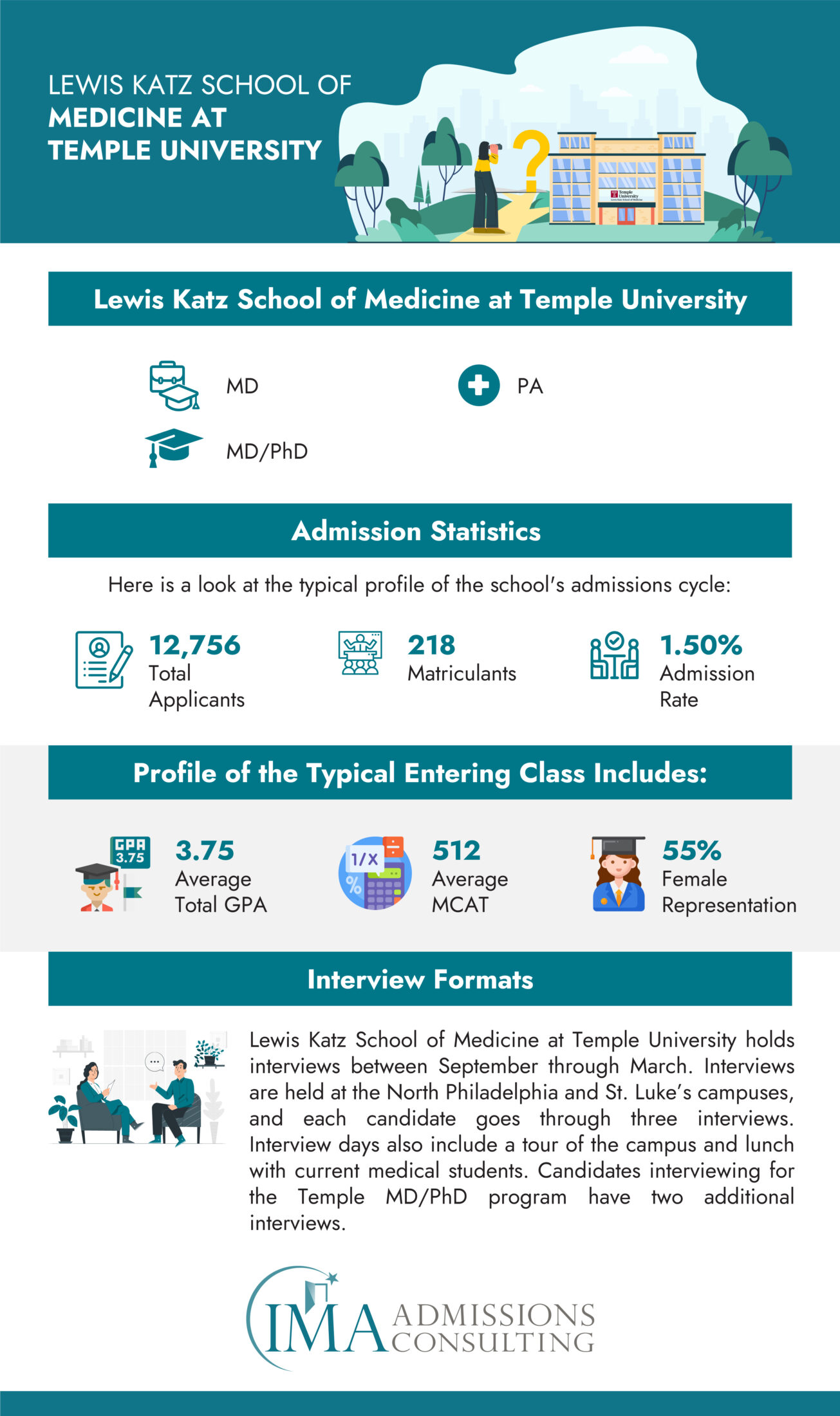
Temple Medical School Tuition & Cost of Attendance
These tuition and fees are based on the Temple Medical School’s 2022-2023 academic year. Fees are subject to change.
Year 1:
- $54,340 In-state/$57,618 Out-of-state Tuition and Fees
- $1,815 Books and Supplies
- $23,236 Room and Board, Travel, and Personal Expenses
- $4,133.07 Health Insurance
$90,455 Total for In-State Students / $94,744 Total for Out-of-State Students
Year 2:
- $54,340 In-state/$57,618 Out-of-state Tuition and Fees
- $1,815 Books and Supplies
- $23,236 Room and Board, Travel, and Personal Expenses
- $4,133.07 Health Insurance
$90,455 Total for In-State Students / $94,744 Total for Out-of-State Students
Year 3:
- $54,340 In-state/$57,618 Out-of-state Tuition and Fees
- $1,815 Books and Supplies
- $23,236 Room and Board, Travel, and Personal Expenses
- $4,133.07 Health Insurance
$90,455 Total for In-State Students / $94,744 Total for Out-of-State Students
Year 4:
- $54,340 In-state/$57,618 Out-of-state Tuition and Fees
- $1,815 Books and Supplies
- $23,236 Room and Board, Travel, and Personal Expenses
- $4,133.07 Health Insurance
$90,455 Total for In-State Students / $94,744 Total for Out-of-State Students
Being knowledgeable can help you navigate this complicated system. For more information on the costs of attending medical schools in the United States, visit our Medical School Tuition Database, where we offer detailed guidance and helpful information.
AMCAS Primary Application & Temple Medical School Secondary Application
You’ll need to complete two applications to be considered a valid candidate for the Lewis Katz School of Medicine at Temple University. The primary application is the standard American Medical College Application Service (AMCAS) which the majority of medical schools in the United States do require.
The AMCAS is going to contain all basic, relevant information about you, your education, and your life in general. You will want to be as careful as you can to fill this application out accurately. Be sure to list all medical schools for which you plan to apply, and AMCAS will forward the application to the schools you have listed.
When the admission committee at LKSOM receives your primary application from AMCAS, they will contact you to request that you fill out the supplemental application designed specifically for LKSOM. This secondary application is aimed at retrieving more specific information about you, such as your medical interests, goals, and plans.
There is a $100 non-refundable fee to complete the supplemental application, although a waiver will be automatically processed if you were already approved for the AAMC FAP program.
At the time of filling out the supplemental application, you can also:
- Pay the $100 Application Fee
- Upload USCIS Documentation to Prove Eligibility
- Provide Updates/Additional Letters
- Track Receipt of Checklist Items
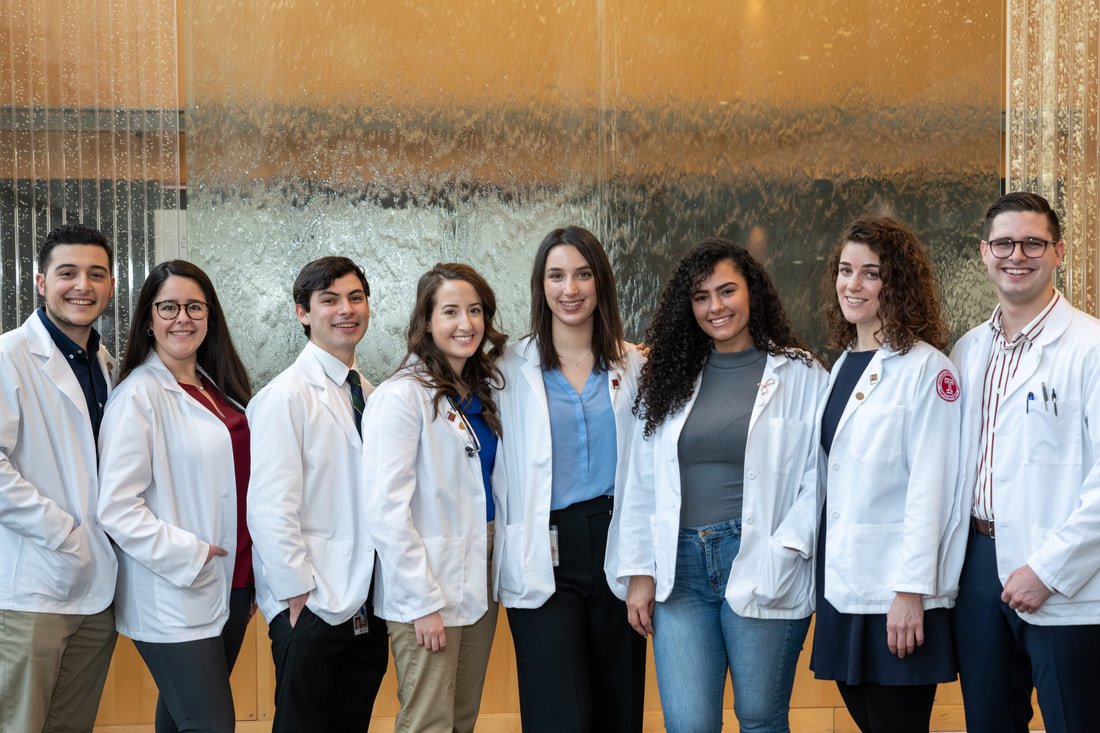
Lewis Katz School of Medicine at Temple University Secondary Application: Essay Prompts, Sample Answers, and Advice
Below are Lewis Katz School of Medicine at Temple University’s secondary essay questions for the 2022-2023 application cycle. All prompts have a 2,000-character limit.
Essay #1
What is the nature of your interest in the Lewis Katz School of Medicine at Temple University?
Prior to answering this prompt, you’ll want to do some deep research on the vision and missions of Temple Medical School. What are they passionate about, and how does that line up with your passions, visions, and missions? You’ll want to highlight those areas where you and the school sync up. Be honest and genuine.
Essay #2
How do you plan on contributing to the Lewis Katz School of Medicine community? *LKSOM seeks an engaged student body with a wide variety of backgrounds, experiences, perspectives, and interests to enhance the medical school experience for everyone. Please use the space below to describe what makes you unique as an applicant, an obstacle that you had to overcome, or how you will contribute to the LKSOM community.
This is a wonderful opportunity to separate yourself from the thousands of other candidates applying. You can use this prompt to paint a picture of who you really are and why you deserve a spot at the Lewis Katz School of Medicine at Temple University. Consider sharing some personal details about yourself, a story that gives you a unique background, and some indication of how being at this school will make it a better institution.
Sample Answer:
You might not know it by looking at me, but my life is a miracle. Three years ago, I was making my way back to campus after a brief lunch break, and I began to cross the street at the crosswalk. I looked left and right before starting across and saw no vehicles. With an ignorant peace of mind, I walked, and then, in a moment’s notice, I was struck on my left side by a red Mazda. The car, driven by a man engaged on his cellphone, had come speeding around the corner and didn’t even slow before hitting me.
I nearly died that day. I was unconscious for several days. I had four broken bones, a fractured skull, and unspeakable pain. By God’s grace and with the help of skilled surgeons, nurses, and therapists, I survived. I was, however, left with an array of scars, both physical and emotional. Months later, having suffered from flashbacks and nightmares, it was determined I was suffering from PTSD from the accident. I worked through my trauma and continued to care for myself, knowing that making my emotional and mental health a priority is important.
Surviving this traumatic accident and experiencing PTSD has made me a much more compassionate person. Having worked with incredible healthcare professionals during my recovery, I have grown to value a humanistic approach to medicine; one of the reasons I so long to study at Temple Medical School. I respect the school’s paradigm of patient-focused, community-aware healthcare. I echo the need for doctors who truly see patients—not just the physical but the emotional brokenness as well.
I believe my experiences, my victories, and my dedication to the concept of treating patients as whole, unique people who are equal in every sense, will make me an excellent student, a valuable member of the student body, and an effective physician.
Essay #3
Tell us about your special interest in the campus you selected. **There are 2 campuses: 1. North Philadelphia and 2. St Luke’s Campus in Bethlehem, PA. The one you select is the one where you’ll be considered for admission.**
This prompt is going to require research and a decision on your part. You must select which campus you want to attend and write about why you would choose that location. Consider aspects of each campus, such as the neighborhood, local hospitals, clinical opportunities, student organizations, etc. Then select which appeals most to you and share that with the committee.
Essay #4
What are your plans for the current year – June 2022 until June 2023?
This question may seem general, but you can go as deep and detailed as you’d like. You do need to make sure to have a plan in place before you write. Think of ways you’d like to grow medically and academically, experiences you’d like to collect, research projects that interest you, books you want to read, and how you’d like to be an active participant in campus life with your peers. Be honest and authentically you.
Essay #5
The Coronavirus pandemic has affected all of us. Please use this space to describe to us how you were impacted academically, personally, or professionally by COVID-19.
The admissions committee wants to get to know you, so let them in. Allow yourself to be vulnerable and share just how your life has been affected by this terrible pandemic. Did it interrupt your education? Did you lose a loved one? How did COVID-19 affect your plans to become a medical professional? Consider these questions as you write your response.
Lewis Katz School of Medicine at Temple University Interview Process
The admissions committee at Temple Medical School makes it a point to create a relaxed environment during interviews. They will not intentionally make candidates feel tense or pressured. The interview process is a way for the committee to determine whether or not you are a good fit for the school and that Temple Medical School is the perfect fit for you.
There will be specific characteristics about you that the admissions committee will be looking for during the interview. The following are a few attributes they like to see:
- Superior Interpersonal Skills
- Good Listener
- Self-confidence
- Compassion
- Socially Aware
- Dedicated and Passionate
Interviews will take place between September and March, and there will be several activities the day of your interview, including: a special welcome from the admissions office, an overview of the medical curriculum and clinical opportunities, a look at student life on campus, and a tour.
Students will participate in three relaxed interviews with a physician or PhD faculty member from the admissions committee, a faculty member who is blinded to the application information, and a member of the local community. MD/PhD program applications will have two additional interviews, one with the director of the MD/PhD program and one with a faculty member from the MD/PhD program.
Preparing for an interview can be stressful, even with Temple Medical School’s laid back approach. Often, students find it helpful to receive personalized coaching and even a mock interview through our medical school admissions consulting services.
Medical School Admissions Consulting
Our vision here at International Medical Aid was to create a program that would truly help our next generation of medical students matriculate into the top medical schools in the country. Applying and interviewing for medical schools is challenging and requires a lot of work. We want to relieve the burden on your shoulders and offer the support you need to complete your application and interview with success.
Whether you feel confident about your interview skills or not, our experts can help you prepare thoroughly for one of the most important interviews of your life. We will walk you through the process, offer expert advice, and even conduct mock interviews to make sure you are as ready as possible.Take a moment to schedule a free consultation with one of our experts here.
Voluntary Healthcare Internships Abroad
One of the greatest learning environments an aspiring physician can experience is shadowing skilled physicians in the trenches of the medical community, spending time with real patients, and getting a taste of what it’s like to work in a hospital or clinic, especially in a foreign environment. If shadowing a physician abroad is something you’ve considered, IMA’s voluntary healthcare internships abroad program is a fantastic choice.
Our pre-med shadowing study abroad program was designed specifically for pre-medical and gap year students with the vision of preparing them more than ever before for their future as a humanistic, global citizen physicians.Please take a few minutes to explore the benefits of our program on our website and reach out if you have any questions.
Best of Luck!
As you take your first step towards matriculating at the Lewis Katz School of Medicine at Temple University, we wish you the best of luck and hope that this guide has brightened your path for the journey.
If you’d like to explore our medical school admissions consulting program, please feel free to contact us, and we will get you the support you need to feel confident.
Whether you looked for medical schools in a different state or searched for medical schools near me, the Lewis Katz School of Medicine at Temple University is a wonderful choice. We hope our guide helps you achieve your goal of attending this fine institution. Be sure to check our other medical school guides:
- Philadelphia College of Osteopathic Medicine (PCOM)
- Geisinger Commonwealth School of Medicine (GCSOM)
- Penn State Medical School
- CUNY School of Medicine
- SUNY Downstate Medical School
- NYIT College of Osteopathic Medicine
- NYU Long Island School of Medicine
- TOURO College of Osteopathic Medicine
- Albany Medical College
- Norton College of Medicine at Upstate Medical University
- Jacobs School of Medicine at the University at Buffalo
- Hofstra Zucker School of Medicine
- Weill Medical College of Cornell University
- University of Rochester Medical School
- Icahn School of Medicine at Mount Sinai
- Renaissance School of Medicine at Stony Brook University
- Albert Einstein College of Medicine
- Ohio University Heritage College of Osteopathic Medicine
- Northeast Ohio Medical University (NEOMED)
- University of Cincinnati College of Medicine
- University of Toledo College of Medicine
- Wright State University Boonshoft School of Medicine
- Ohio State University College of Medicine
- Rowan University School of Osteopathic Medicine
- Hackensack Meridian School of Medicine (HMSOM)
- Rutgers New Jersey Medical School (NJMS)
- Rutgers Robert Wood Johnson Medical School
- Cooper Medical School of Rowan University (CMSRU)
- A.T. Still University Kirksville College of Osteopathic Medicine
- Saint Louis University School of Medicine
- University of Missouri Medical School
- Kansas City University (KCU)
- UMKC School of Medicine
- New York Medical College
- University of Pittsburgh School of Medicine
- University of Wisconsin Medical School
- VCU School of Medicine
- University of Maryland School of Medicine
- Case Western Medical School
- University of North Carolina Medical School
- University of Florida Medical School
- Emory University School of Medicine
- Boston University College of Medicine
- California University of Science and Medicine
- UC San Diego Medical School
- California Northstate University College of Medicine
- Touro University of California
- CHSU College of Osteopathic Medicine
- UC Davis School of Medicine
- Harvard Medical School
- UC Riverside School of Medicine
- USC Keck School of Medicine
- UT Southwestern Medical School
- Long School of Medicine at UT Health San Antonio
- University of the Incarnate Word School of Osteopathic Medicine
- UT Austin’s Dell Medical School
- UTMB School of Medicine
- McGovern Medical School at UT Health
- Johns Hopkins School of Medicine
- McGovern Medical School at UT Health
- The University of Texas Rio Grande Valley School of Medicine
- UNT Texas College of Osteopathic Medicine
- University of Houston College of Medicine
- Texas A&M College of Medicine
- Johns Hopkins Medical School
- Baylor College of Medicine
- George Washington University School of Medicine
- Vanderbilt University School of Medicine
- St. George’s University School of Medicine
- Lake Erie College of Osteopathic Medicine (in Pennsylvania)
- Sidney Kimmel Medical College at Thomas Jefferson University
- Wake Forest University School of Medicine
- Western University of Health Sciences (in California)
- Drexel University College of Medicine
- Stritch School of Medicine at Loyola University Chicago
- Georgetown University School of Medicine
- Yale School of Medicine
- Perelman School of Medicine
- UCLA Medical School
- NYU Medical School
- Washington University School of Medicine
- Brown Medical School
Feel free to contact us if you have questions about the application process, our medical guides, our pre-med shadowing study abroad program, or our Medical School Admissions Consulting services.



